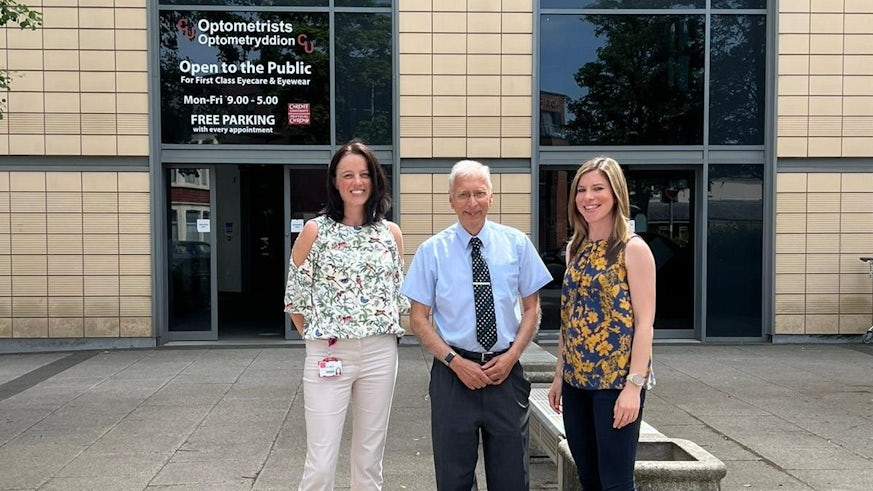Cardiff University researchers drive forward NHS availability of sight saving corneal therapy in Wales
13 June 2022

A sight-saving therapy called corneal cross-linking has recently been approved for use by the Welsh Government for the treatment of keratoconus patients as young as 11 years old.
Corneal cross-linking is used to stiffen the cornea and stop the progression of keratoconus, a condition which causes the cornea to thin, weaken and bulge outwards resulting in severe, irregular astigmatism.
Dr Sally Hayes, Prof Keith Meek and Dr Siân Morgan of the School of Optometry and Vision Sciences at Cardiff University have been at the forefront of research into corneal cross-linking as co-founders of the UK Cross-Linking Consortium, a forum for ophthalmologists, opticians, and vision scientists committed to the advancement of the therapy.
In 2013, the therapy was approved by the National Institute for Health and Care Excellence (NICE), and made available on the NHS in England and Scotland. However, it was not approved in Wales as a review of the therapy undertaken on behalf of the Welsh Government deemed the evidence of its effectiveness to be insufficient at the time.
Earlier this year, Health Technology Wales (HTW), a Welsh Government funded organisation which works to improve health technology, conducted a re-review of the clinical and cost-effectiveness of corneal cross-linking for children and adults with progressive keratoconus.
HTW subsequently concluded that ‘the evidence supports the routine adoption of corneal cross-linking (CXL) for children and adults with progressive keratoconus’.
Dr Sally Hayes, who was involved in the HTW review process as an independent expert said: “The availability of corneal cross-linking on the NHS in Wales will vastly improve the lives of patients with keratoconus. Not only is corneal cross-linking the only way to stop progressive keratoconus from worsening, but it helps patients avoid a corneal transplant, which requires major surgery.”

“I’m proud to be part of the UK Cross-linking Consortium, an incredible team of clinicians, optometrists and vision scientists, who have been instrumental in getting the green light for corneal cross-linking use in Wales”.
In HTW’s final report, the contribution of the UK Corneal Cross-linking Consortium to the consultation process was acknowledged as follows: ‘Following consultation with Optometry Wales and the UK Corneal Cross-linking Consortium, HTW agreed it was appropriate to issue updated Guidance, due to substantial changes to the evidence base since the original Guidance was issued’.
Swansea Bay Health Board are the first in Wales to offer NHS provision of the treatment, but three further corneal cross-linking hubs in north, south-east and south-west Wales are planned for the future to increase patient accessibility.
The award of a 5-year, £2.4million Medical Research Council grant to Prof Keith Meek, Prof Andrew Quantock, Dr Sally Hayes, and Dr James Bell for a large-scale study on the cornea has helped ensure that Cardiff University’s School of Optometry and Vision Sciences Cardiff University, in association with the UK Cross-linking Consortium, continue to play a leading international role in the development of improved treatments for keratoconus and other corneal diseases.



